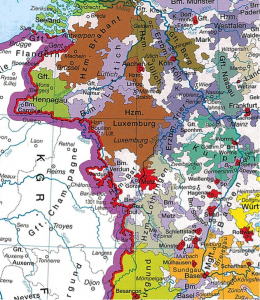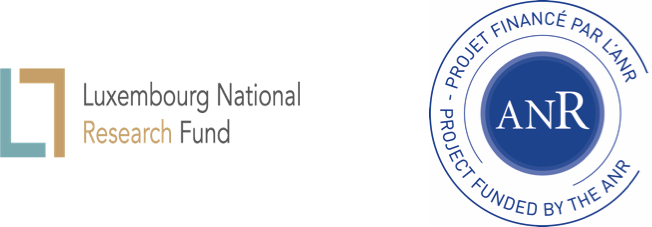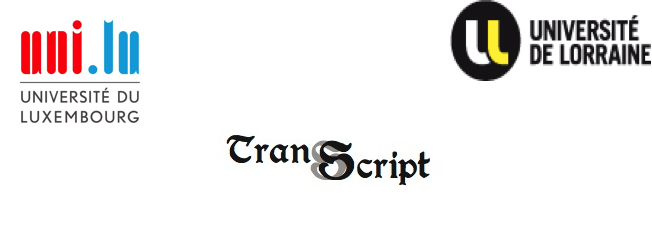TRANSSCRIPT
Writing and Governance. Cultural transfers between France and the Empire (13th-16th centuries)
TRANSSCRIPT is a four-years international project co-funded by French ANR (Agence Nationale de la Recherche) and Luxembourgish FNR (Fonds National de la Recherche). Launched in 2014, autumn, this project is implemented under the coordination of two teams: the Atelier de Diplomatique of the Centre de Recherche universitaire Lorraine d’histoire (Cruhl) of the University of Lorraine, based in Nancy (project leader: professor Isabelle Guyot-Bachy), and the Institute for History of the University of Luxembourg (project leader: professor Michel Margue).
The acronym TRANSSCRIPT stands for “cultural TRANSfers” + “SCRIPTurality”.
The main purpose of TRANSSCRIPT project is to explore late-medieval writing practices by combining two fields of study: the governance of medieval states at the regional level and cultural transfers in the former Lotharingian space, i.e. between regions straddling two sides of a linguistic border. By doing so, we will gain a better understanding of the comparative history of territorial principalities in the northern boarder area between France and the Empire.

Medieval Lotharingian fragmentation (Duchy of Brabant; Duchy of Limburg; Duchy of Lorraine; County/duchy (from 1353) of Luxembourg; County of Namur; County of Hainaut; County/duchy (from 1354) of Bar; Ecclesiastical principality of Liège; Ecclesiastical principality of Trier)
- TRANSSCRIPT project takes a new approach to the study of late-medieval writing practices by combining two fields of study: the governance of medieval states at the regional level and the cultural transfers between regions straddling two sides of a linguistic border. To explore these two strands, the project seeks to analyse the development of scripturality, i.e. the production and use of written documents (both princely charters and administrative documents) within two contexts: the geopolitical context of territorial principalities within the former Lotharingian space, on the border between the kingdom of France and the Holy Roman Empire (the current Greater Region, Saar – Lor – Lux – Rhineland – Palatinate – Wallonia including the German speaking Community), and the cultural context of the onset of administrative writing and the progressive transition from Latin to the vernacular.
- The duchy of Lorraine and the county, later duchy, of Luxembourg are at the core of TRANSSCRIPT project. A major part of the project will consist in the edition of princely charters from these two territories from the mid-thirteenth to the second half fourteenth century. The editorial project will be complemented by a study of the evolution of princely institutions in both principalities in the same period and up to the beginning of the fifteenth century, with the main objective of writing a socio-cultural and comparative institutional history. ‘Writing’ and ‘counting’ are indeed two key processes to govern, to manage land and people. Through their study, historians can explore the reality of medieval power. In their formal aspects, ‘writing’ and ‘counting’ are pervious to cultural transfers (origin of traditions, issues of ‘normalization’ as a manifestation of the growing public administration, etc.). Far from being reduced to a fixed state of ‘texts’, they bring to light the protagonists and mediators (patrons, recipients, witnesses, scribes, messengers) of an active and complex, political and social communication, of which they carry an ideological discourse.
- From the perspective of administrative, institutional, and political written productions, the medieval area of today’s Greater Region with its political fragmentation and linguistic border represents one of the best cases to study cultural transfer processes in Europe from the thirteenth to the fifteenth century. The project will provide a deeper understanding of the formation of regional identities – as such always multiple, dynamic, and open to intermutual influences – within the context of medieval statehood.


